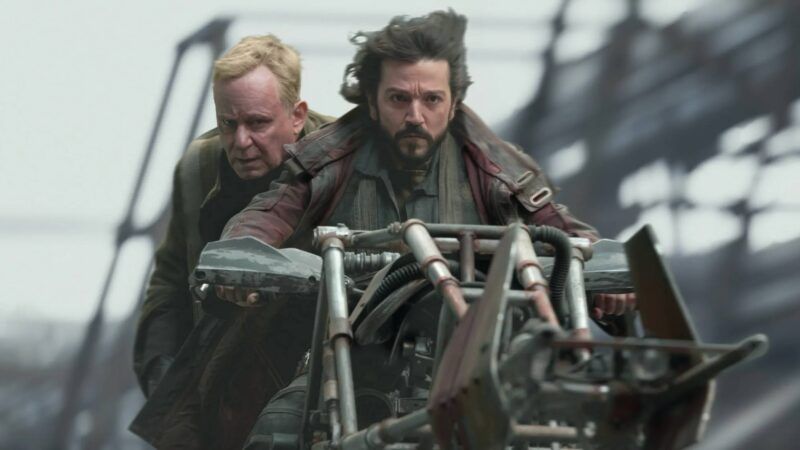Andor Is a Star Wars Show About the Brutality of Bureaucracy
Tony Gilroy's series reminds us that an empire doesn't need dark magic to be evil.

Since the dawn of Star Wars, there's never been any confusion about whether the Empire is good or bad: The Empire is, and has always been, evil, committing acts of planetary genocide while attempting to put down the forces of the Rebellion. But the type of evil the Empire engages in has long been mired in fantasy trappings: The Empire is on the Dark Side of the Force—evil magic, more or less, wielded by what are essentially evil wizards, in service of mystical darkness.
This makes it easy to forget that the Empire is a government, a ruling authority with military and governing bodies, populated mostly by rule-following and rule-making humans rather than wizards. Those humans operate as government functionaries often do—as bureaucrats, tasked with overseeing staff and systems in order to achieve the Empire's governing objectives, whatever they might be.
It's easy to forget that those bureaucrats and functionaries are not only just as bad as any of the dark magic-wielding wizards slaying innocents with laser swords—they are the chief implementers and supervisors of the Empire's evil intentions.
That's the genius of Andor, the excellent two-season Star Wars prequel series that just wrapped up on Disney+. It's an extended examination of the Empire's ruthless bureaucracy, the vast, uncaring machine of misery and repression that gave rise to the Rebellion. Andor is the story of a once-democratic citizenry whose spirit was crushed by technocratic totalitarianism.
Andor is a prequel to the best of the Disney-era Star Wars films, Rogue One, a standalone film that looks better and better in retrospect, given the disaster of the mainline films. Rogue One was itself a prequel, following the Rebellion's effort to steal the plans for the Death Star that was the central threat in A New Hope. But with 24 episodes spread across two seasons, Andor has the opportunity to fill out the franchise's backstory in ways no movie could. And what it demonstrates, to chilling and thrilling effect, is that the Empire was evil not only because it aligned with the dark side of some mystical magic, but because it was an authoritarian bureaucracy, with all the tendencies that are endemic to bureaucratic rule.
This is familiar territory for series mastermind Tony Gilroy, who scripted the first four Bourne films, all of which dealt with relentless and powerful national security apparatuses. But it's relatively new for Star Wars, which has tended to focus more on the magical conflict between Jedi and Sith, the light and dark sides of the force. Yes, there have been hints of the Empire's secular ruthlessness, but these have largely been treated as footnotes to the mystical conflict between wizards with laser swords.
There are no lightsabers in Andor, and only the scarcest mention of the Force. Instead, there are agents of the Imperial Security Bureau, a sort of CIA-meets-FBI-meets-NSA all-purpose intelligence operation that carries out the Empire's imperatives. And in this case, the imperative is to build a vast, new clean energy system to power the Empire's operations.
Except, of course, that the clean energy program is just a ruse, a cover for the construction of the planet-killing, moon-sized, space-station weapon—the Death Star.
It's more than a little bit amusing that the Empire cloaks its genocidal ambitions in a lie about bountiful green energy tech. But what Gilroy's series shows is that even if the Empire really were simply seeking to build out a new clean energy program, it would still be unaccountably evil. That's because the Imperial bureaucracy operates with total disregard for the lives and freedom of the people it oversees. There's no limit to its power, nothing to keep its ambitions in check.
Nothing, that is, except the determination of certain people to be free of its murderous rule. This is the goal of the Rebellion, the scrappy, self-organizing force that rises up to fight back against Imperial power. The mutually shared enemy, however, only barely keeps the Rebellion aligned internally. Indeed, one of the strengths of both Andor and Rogue One is the way they tease out the internal conflicts of the Rebel Alliance, the factional disagreements about violence and methods that divide the various good guys from one another. All of the Rebels might be nominally committed to the same cause, but they are not remotely in agreement about the best way to pursue their goals.
As with the Empire itself, the conflict isn't really about good magic vs. bad magic, but about policies, procedures, and principles, the sometimes boring but always vital mechanisms of government and societal organization. There's nothing mystical about it—just the hard work of finding a way to preserve life, liberty, and human dignity every single day.
